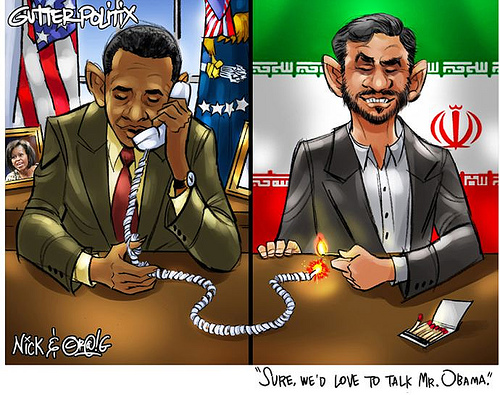This article was originally posted on Dissected News, where James Miller (James the Hype) will be covering the anniversary of the election in Iran.
OK, a quick overview of this week’s news.
1) On Sunday, Brazil and Turkey announce a nuclear fuel swap with Iran. The deal, which would have potentially ended months of diplomatic fighting between Iran and the rest of the world, would work like this: Iran would export much of its enriched uranium, and then fuel rods would be returned for use in medical reactors. This is shocking news.
2) Hillary Clinton and President Obama give Iran, Turkey, and Brazil the middle finger. Instead of thanking them all for their time and concern, Clinton announced that a new sanctions package had been agreed upon between the members of the p5+1 (UK, US, France, Germany, Russia, and China). Basically, the assumption has been made that Iran is still not in compliance with the wishes of the UN or the Non-Proliferation Treaty (NPT), and this is just another tactic to avoid sanctions.
3) Mass turmoil and confusion.
Now that we’re all caught up, let’s talk about the common heard points of view about this, as seen in much of the media coverage and as spoken by many political leaders, listed (in my estimation) from most common to least.
Viewpoint 1) Iran is a militant state, an enemy to the free world and a sponsor of terrorism, and Iran constitutes an existential threat to the U.S., so we should do everything we can to stop them from getting the bomb.
-
- 1A – Bomb Iran
- 1B – sanction Iran
- 1C – Zionism. The U.S. and Israel really are a united front against Islam, and they should conquer the world together.
Viewpoint 2) Everything the U.S. says and does is the product of a Zionist, Pro-Israel, hyper imperialist agenda, and this is no different. Therefore, we should do nothing.
Viewpoint 3) Iran is not developing nuclear weapons, so leave them alone.
-
- 3A – Ahmadinejad is misunderstood. Last year’s election in Iran was valid (au contraire, mis amigos). The U.S. are the terrorists.
- 3B – There is no evidence. This is just like Iraq’s WMDs.
Viewpoint 4) Ahmadinejad is a real douche/swell guy, but Israel has nukes and so should Iran.
Here is the problem. There is an element of truth in all of many of these statements (in the core of them, not necessarily the radical fringe), but there is as much (or more) misinformation and manipulation. None of the conventional wisdom works anymore, but the U.S. had an opportunity to change the tune when it came to Iran. And the blew it.
So what happened?
Lots of complicated things. One way of looking at this is that months Obama and Clinton have been changing some of their ideological stance towards Iran. At the UN, this was all about Iran’s nuclear program, but outside of the UN this was about human rights, smuggling, and the potential for regime change. The new administration had given up on making the Islamic Republic into a cooperative government that was interested in a peaceful 21st century, so the government of Iran had to go. However, they couldn’t say this publicly for fear of losing China and Russia, so they’ve made this all about Iran’s nuclear program. Lose that, and the covert issues would have to be dropped or addressed in a more overt fashion. This was determined to be impossible, and so the p5+1 had to step in and stop Turkey and Brazil.
Another option is that the U.S. (or the whole p5+1) felt threatened by the rising powers of Turkey and Brazil, and further threatened by the prospect of unity with Iran in the Middle East. Therefore, if the U.S. managed to deal with Iran, that would be ok, but thisindependent side deal would not be acceptable. A related possibility is that Obama is trying to curb U.S. imperialistic tendencies without giving up any of the advantages gained by our imperialistic past. Therefore, if the U.S. is powerless but two upstarts could make deals, then this would defeat that goal.
The last option I can think of is this: if Iran gave up its nuclear power, Syria’s enrichment plants have been bombed, and no Arab states seem to be pursuing proliferation, then won’t the entire world call for the disclosure and dismantlement of Israel’s nuclear weapon arsenal?
The kicker is that, just like the 4 most commonly held myths viewpoints about Iran, there is truth and fiction in each one of these options. However, the Obama administration was given the opportunity to eliminate the myths and start a new chapter in U.S. foreign policy. Instead, he scrambled to defend the old policy.
Lack of change domestically can be blamed on predecessors or legislatures, but Obama owns his own foreign policy legacy.
<a href=”http://therealbarackobama.files.wordpress.com/2009/01/obama-and-ahmadinejad-2.jpg”>(image source)</a>

